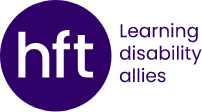You might notice we look a little different, it’s all part of our new long term strategy:
Hft 2033: Your life. Your way.
Download our Hft 2033 strategy here Download our Easy Read Hft 2033 strategy hereWe listened to what people told us
We listened to what learning disabled adults and their families told us they wanted and then we worked with colleagues in focus groups to shape the strategic themes:
- Living with choice and control
- Building meaningful connections and relationships
- Finding and sustaining a meaningful occupation, work or volunteering.
- Enhancing lives through activities and experiences
Our strategy will help us reach:
- more people who need our support,
- more supporters to connect to our cause,
- more commissioners to partner with us,
- and more decision makers to involve us in decisions that affect our sector or people with a learning disability.

Why now?
Achieving our vision against a backdrop of funding, quality and political pressures means we’ll need to focus our energy and resources on what learning disabled people have told us matters most. Our new strategy helps us to take business decisions to respond to these challenges.
The social model of disability
As part of our new strategy we are moving away from the more ‘traditional’ medical model of disability, which takes a view that the reason a person is unable to do something is because of their disability and their medical condition. It focuses on ‘fixing’ or resolving the disability with medical interventions.
Instead we are moving toward the social model of disability, which takes a view that individuals are dis-abled by the systems, attitudes and environmental barriers around them. With the right support and a fully accessible society, people could overcome barriers even if they continued to live with their disability.
Identity first language
As part of the social model of disability we will be changing the way we talk about learning disabled people. We know this might take some time to get used to.
We’ve long been taught to use ‘person first’ language – putting the person first and emphasising that the individual is not defined by their disability or condition but that assumes that the disability is not a positive part of their identity. We want to change that, by adopting language that puts ‘Identity first’, accepting that a person’s disability or condition is part of their identity.
The social model uses Identity first language. Going forward, when speaking as Hft we will be using identity first language.
BUT… when speaking to individuals, we should always ask what they would prefer. They may choose ‘learning disabled person’. They may choose ‘person with learning disabilities’. Or they may choose neither! And that’s fine. If a person just wants to be known as Bob, then we’ll just say ‘Bob’!
Our Vision, Mission, and Values
Our Vision
![]()
We’re creating a world where learning disabled adults can live the best life possible.
Our Mission
![]()
We’re on a mission to change the lives of learning disabled people for the better. So you and your family can live the best life possible. Providing personalised support. Creating solutions for living independently. Coming together to campaign for positive change. Fundraising for new opportunities and a bigger impact.
Home. Work. Leisure. Together.
Your life. Your way.
Our Values
![]()
We’re diverse. We appreciate that everyone is unique, so we champion equity, diversity and inclusion.
We’re kind. Our compassion shines through everything we do.
We’re positive. We focus on finding solutions, partnering up for progress and getting others involved.
We’re visionary. We are proud to paint a picture of what best life possible could look like.


